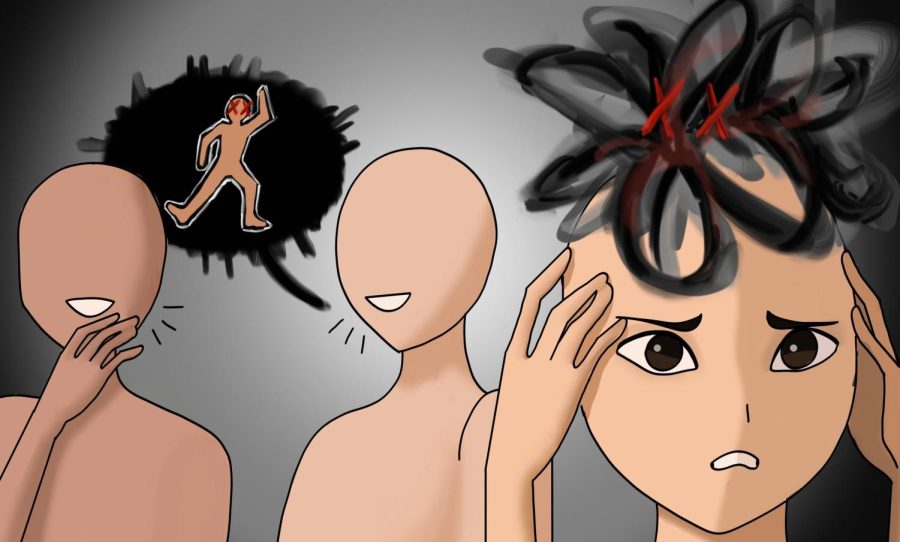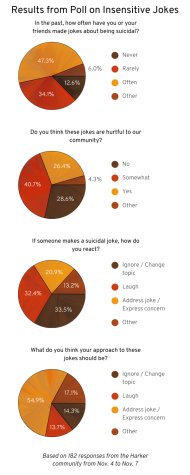Editorial: Insensitive jokes harm environment
With suicide in the top three leading causes of death amongst teenagers, it’s alarming that we are so used to hearing these words that we don’t notice them anymore. These jokes trivialize suicidal thoughts and imply that this problem is commonplace, normal and even insignificant.
Content warning: This article mentions suicide.
For free and confidential support, call the Suicide and Crisis Lifeline at 988.
Discussions of concerns circulate the room as anticipation rises for the teacher to pass back tests. But out of the myriad thoughts and remarks, one in particular passes by constantly without consideration.
“If I don’t get an A I’m gonna —”
We’ve all heard this comment before. Maybe you’ve even been the one to say it. These jokes dismiss suicidal thoughts as unimportant, making it difficult to distinguish whether the person is trying to be funny or actually needs mental help. With suicide in the top three leading causes of death amongst teenagers, it’s alarming that we are so used to hearing these words that we don’t notice them anymore. These jokes trivialize suicidal thoughts and imply that this problem is commonplace, normal and even insignificant.
According to a 2020 University of Tennessee study, people who make suicidal jokes are often those who are suffering from suicidal thoughts themselves. So, for people who use these comments as an outlet, there are concrete ways to address these feelings in a healthier manner, including, for example, suicide hotlines to talk to health workers or genuine conversations with friends or trusted adults.
Students telling such jokes during school meetings, or worse, teachers joking about similar situations in class, only magnifies the issue. 47.3% of 182 Harker students and faculty, roughly one-fourth of the community, who responded to a multiple-choice survey say that they or their friends make jokes about being suicidal “often.” Regardless of people’s true intentions, jokes about suicide or other mental health issues treat these topics as punchlines for a quick laugh rather than serious problems that require discussion and potentially professional help.
Additionally, people on the receiving end of the humor often respond in ways that are unintentionally uncaring. Based on the same poll, out of the respondees, 32.4% said they would laugh in response to a suicidal joke while another 33.5% said they would ignore it or change the topic of discussion. However, when asked about what the proper approach to suicidal jokes should be, 54.9% chose the option “address the joke or express concern,” with only 20.9% actually doing this in a real situation. When presented with such situations, seek to understand first and then lend an ear to the person making the joke in order to foster a safe and empathetic environment for those around us.
Considering that half of all lifelong mental health illnesses start by the age of 14, the age when many students start high school, our community should strive to maintain respect and demonstrate care when discussing these issues, especially in the years significant to our development.
We need to hold these discussions with our friends. Being mindful of others’ feelings means holding friends accountable for these jokes — as well as ourselves — with kindness and understanding since they could be struggling with suicidal thoughts.
These steps are small actions to take but can go a long way in making people in our community feel less uncomfortable and more willing to come forward about struggles with mental health.

Margaret Cartee 12) is a co-managing editor for Harker Aquila, and this is her fourth year on staff. This year, Margaret wants to do more illustrations...


















![“[Building nerf blasters] became this outlet of creativity for me that hasn't been matched by anything else. The process [of] making a build complete to your desire is such a painstakingly difficult process, but I've had to learn from [the skills needed from] soldering to proper painting. There's so many different options for everything, if you think about it, it exists. The best part is [that] if it doesn't exist, you can build it yourself," Ishaan Parate said.](https://harkeraquila.com/wp-content/uploads/2022/08/DSC_8149-900x604.jpg)




![“When I came into high school, I was ready to be a follower. But DECA was a game changer for me. It helped me overcome my fear of public speaking, and it's played such a major role in who I've become today. To be able to successfully lead a chapter of 150 students, an officer team and be one of the upperclassmen I once really admired is something I'm [really] proud of,” Anvitha Tummala ('21) said.](https://harkeraquila.com/wp-content/uploads/2021/07/Screen-Shot-2021-07-25-at-9.50.05-AM-900x594.png)







![“I think getting up in the morning and having a sense of purpose [is exciting]. I think without a certain amount of drive, life is kind of obsolete and mundane, and I think having that every single day is what makes each day unique and kind of makes life exciting,” Neymika Jain (12) said.](https://harkeraquila.com/wp-content/uploads/2017/06/Screen-Shot-2017-06-03-at-4.54.16-PM.png)








![“My slogan is ‘slow feet, don’t eat, and I’m hungry.’ You need to run fast to get where you are–you aren't going to get those championships if you aren't fast,” Angel Cervantes (12) said. “I want to do well in school on my tests and in track and win championships for my team. I live by that, [and] I can do that anywhere: in the classroom or on the field.”](https://harkeraquila.com/wp-content/uploads/2018/06/DSC5146-900x601.jpg)
![“[Volleyball has] taught me how to fall correctly, and another thing it taught is that you don’t have to be the best at something to be good at it. If you just hit the ball in a smart way, then it still scores points and you’re good at it. You could be a background player and still make a much bigger impact on the team than you would think,” Anya Gert (’20) said.](https://harkeraquila.com/wp-content/uploads/2020/06/AnnaGert_JinTuan_HoHPhotoEdited-600x900.jpeg)

![“I'm not nearly there yet, but [my confidence has] definitely been getting better since I was pretty shy and timid coming into Harker my freshman year. I know that there's a lot of people that are really confident in what they do, and I really admire them. Everyone's so driven and that has really pushed me to kind of try to find my own place in high school and be more confident,” Alyssa Huang (’20) said.](https://harkeraquila.com/wp-content/uploads/2020/06/AlyssaHuang_EmilyChen_HoHPhoto-900x749.jpeg)





